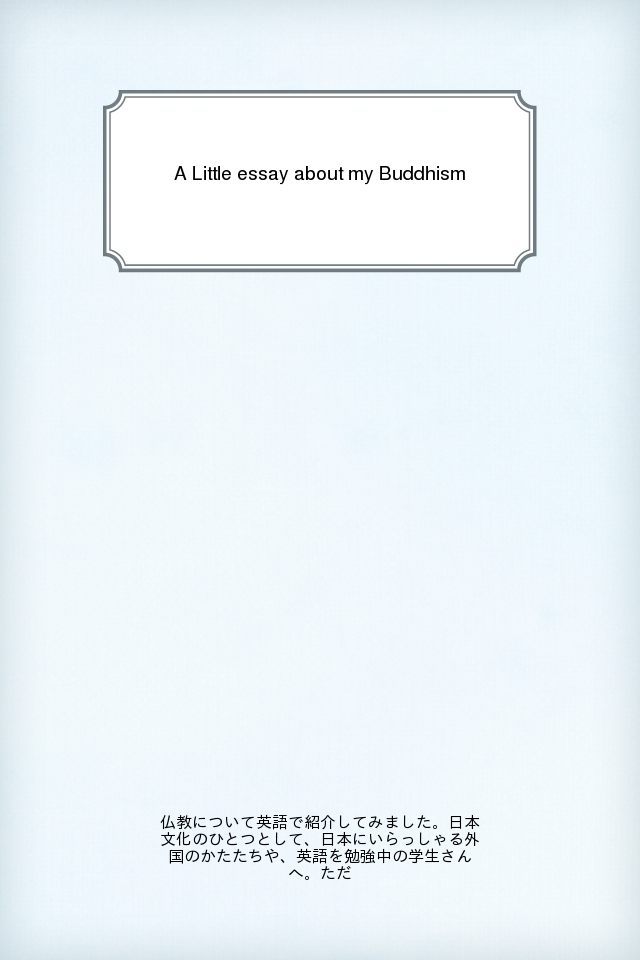A Little essay about my Buddhism

Readers,girls and boys of ForkN.
I try to write about " The Middle Way"(『中論』) of Nagarjna(竜樹) of Buddhism in English.
Readers of forkN read various contents of Epub, novels, essays, or anime,...photos,...and so on.
Now I'm openng the presentation for ForkN about "Lotus sutra" (『法華経』) of Buddhism.
Do young people know that Lotus-sutra was one of Buddhists' texts , and it is wide spread into Japanese culture and religious scenes,
Many priests and nuns recite this sutra on funerals in Japan. But it was originarily preaches of Buddhism,
It wasn't meaningless.
Now I want to explain about another text of Buddhism. It is titled as "The Middle Way".
But that title doesn't imply a compromise except the extreme. Readers must get the meaning of the "middle".
The author of "the Middle Way" , Nagarjna declined that all discussions are wrong at all .
From ancient period , people argued about the truth of humane beings , reality between subjects and objects , and eternity beyond deaths.
But Nagarjna denied all proposals about existences .
Maybe he couldn't accept dispute of words . Words doesn't prove reality , he thought . Shadows follows any kind of words . Shadows means maybe errors .
If I say ,
" I love you ",
but , I don't have proof and I have alteration of something of dislike ,...maybe...?
After all, I don't express a fact.
I feel that Nagarjna is something nihil.
Religious love maybe different from worldly passion .
Tibetan Dalai-Lama persuades people into taking equal minded love to others .
Recently Dalai-Lama retired from the King who holds both the govermental title and the religious head master of Tibet. The young person was elected as the President of Tibetan refugees in Dalam-sala.
Dalai-Lama loves divided people of Tibet.
But his talk is agreed by broad world, because his talk maybe free from ethnic ultra-nationalism.
I feel that he has universal sense of Buddhism, and he is philanthropism (博愛主義),
On the other, I don't know life of overseas outside of Japan. My knowledge of Buddhism binds to ethnic heritage of Japanese Buddhism .
In ancient piriod , Japanese people had received Buddhism ( 6c. A.D) , from then , we have succeeded to benefit of ideas.
In my youth , I met a few splendid masters of Buddhism who got the answer of Buddhism , perhaps. They attained the goal of Buddhism by practice ( Samadi ), and by study.
I introduce one of them.
He was " Gen-san " in his nickname, he was sometimes laughing well in his loud cheerful voice. Also Dalai-Lama's laughter was happily, too.
I think that Gen-san was a modern Prasangika ( 帰謬論証派).
I explain Prasangika.
By a dictionary, Prasangika's way of discussion was to find errors of enemies in arguments without own opinion. They, whoever wants to talk about existence one by one, will fail into drawback or errors by contradiction( 矛盾).
・・・having a sigh・・・
After all, words cannot prove an individual reality, maybe.
Gen-san was a splendid intelligence in Japan, and he was a modern Prasangika, so he hitted against opponents.
he killed the identity of the opponents in the debating place. But he didn't win, only he indicated the errors of opponents.
I continue to write about my essay.
" What is the Buddha?"
This is the question of questions that all Buddhists ask.
Is the Buddha the absolute one ?
Is the Buddha almighty?
The Buddha has all knowledges and and all abilities, hasnt the one ?
Maybe not, Buddhists don't think so.
Each life of everybody is due to the Buddha? We don't think so.
The happy or the unlucky is caused by the Buddha's will ? We don't think so.
The one thing that we can do is " believing " ? We don't think so.
Buddhism doesn't advise a person to believe the One simply , but Buddhism request a person to practice of Buddhism. Practice isn't a rehearsal , it means the course of metamorphosis (変身) into a Buddha.
But to tell the truth , I think that this theme---namely , " what is the Buddha ?" --doesn't need among Buddhism .
During the history of Buddhism , Buddhists hasn't held a debate on the absolute one , so we don't worship the idol of Buddha as an icon .
Buddha is the goal of our practice .
Am I an atheist ? Maybe so .
But I am an Buddhist .
The word " atheism " means that a god doesn't exist .
Still more , it is complicated on Kanji ( 漢字) character , 神(かみ 、god ) is used various religious scenes .
The absolute god like Christianity or Islam , that usages are well known . And many gods and godess , they are talked in myths .
Buddhism has many gods and godess by those usages .
Japanere Shinto-ism has many gods and godess .
But , in the Buddhists' texts , that Kanji " 神” was used about " mind " , " heart " . Namely it is " 精神” (せいしん , mind ) from ancient philosophical texts of Buddhism .
-
-
A Little essay about my Buddhism
0











